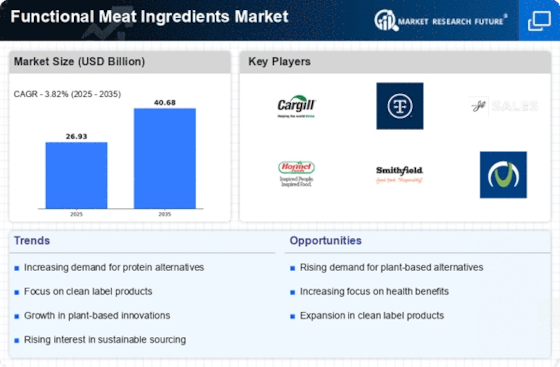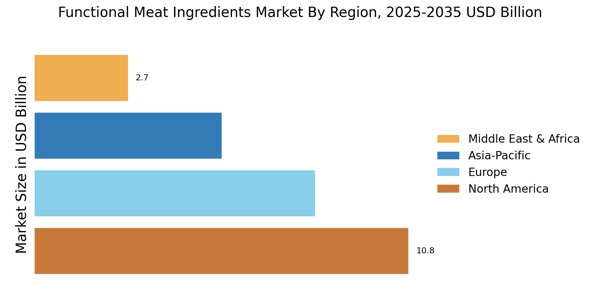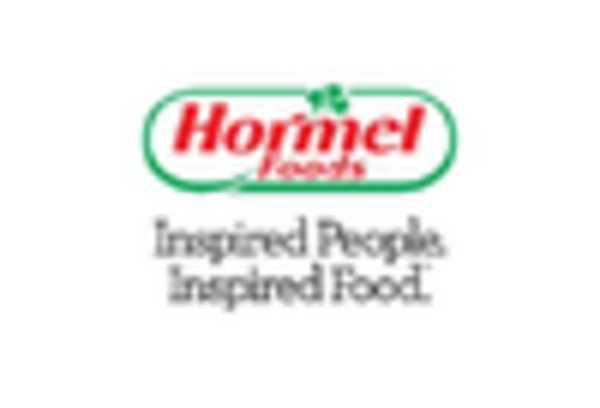Health Conscious Consumer Trends
The increasing awareness of health and wellness among consumers appears to be a primary driver for the Functional Meat Ingredients Market. As individuals become more health-conscious, they seek products that offer nutritional benefits, such as high protein content and low fat. This trend is reflected in market data, indicating that the demand for functional meat ingredients is projected to grow at a compound annual growth rate of approximately 6% over the next five years. Consumers are increasingly looking for meat products that not only satisfy their taste preferences but also contribute positively to their overall health. This shift in consumer behavior is likely to encourage manufacturers to innovate and develop new functional meat products that align with these health trends.
Sustainability and Ethical Sourcing
Sustainability concerns are becoming increasingly prominent in the Functional Meat Ingredients Market. Consumers are more inclined to support brands that prioritize ethical sourcing and environmentally friendly practices. This shift is evidenced by a growing number of companies adopting sustainable practices in their supply chains, which is likely to enhance their market appeal. According to recent studies, nearly 70% of consumers express a preference for meat products that are sourced sustainably. This trend not only influences purchasing decisions but also compels manufacturers to invest in sustainable practices, thereby potentially increasing their market share. As the demand for ethically sourced meat ingredients rises, companies that align with these values may experience a competitive advantage.
Rising Demand for Protein-Rich Diets
The growing trend towards protein-rich diets is a notable driver for the Functional Meat Ingredients Market. As more consumers adopt high-protein diets for weight management and muscle building, the demand for meat products that are rich in protein is expected to rise. Market data indicates that the protein ingredients segment is anticipated to witness a growth rate of around 7% annually. This trend is particularly evident among fitness enthusiasts and health-conscious individuals who prioritize protein intake. Consequently, manufacturers are likely to focus on developing functional meat ingredients that cater to this demand, potentially leading to an expansion of product lines that emphasize protein content.
Evolving Culinary Trends and Preferences
Evolving culinary trends and consumer preferences are shaping the landscape of the Functional Meat Ingredients Market. As consumers become more adventurous in their food choices, there is a growing interest in diverse flavors and unique meat products. This trend is reflected in the increasing popularity of gourmet and specialty meat items, which are often enhanced with functional ingredients. Market Research Future indicates that the demand for specialty meat products is expected to grow by approximately 5% over the next few years. This evolution in culinary preferences encourages manufacturers to innovate and experiment with new flavor profiles and functional enhancements, thereby expanding their market reach and catering to a broader audience.
Technological Innovations in Food Processing
Technological advancements in food processing are significantly influencing the Functional Meat Ingredients Market. Innovations such as improved preservation techniques and enhanced flavoring methods are enabling manufacturers to create high-quality functional meat products that meet consumer demands. For instance, the introduction of natural preservatives and flavor enhancers has allowed for longer shelf life without compromising taste or nutritional value. Market analysis suggests that the integration of technology in meat processing could lead to a 10% reduction in production costs, thereby increasing profitability for manufacturers. As technology continues to evolve, it is likely that the market will see a surge in innovative products that cater to the health-conscious consumer.

















